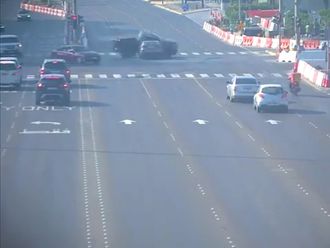Abu Dhabi: Existing ride-hailing apps may not be servicing commuters in the capital right now, but a top transportation official said that other firms are eager to enter the market.
Uncertainty about the existing standards for ride providers, as well as alleged reports of drivers being detained, saw Dubai-based Careem and San Franciso-headquartered Uber suspending services in Abu Dhabi on August 27.
“We understand that commuters want a range of choices. So Uber and Careem can start offering their services ‘yesterday’, as long as they do it under the existing regulations. In the meantime, we are open to other providers joining the market. In fact, a Germany-based firm, myDriver, has already approached us about the standards so that it can legally offer services,” Mohammad Al Qamzi, general manager at the Centre for Regulation of Transport by Hire Cars – TransAD, told Gulf News.
“We are also looking at other avenues to increase consumer choice. For instance, we are looking to integrate limousine services into the TransAD app itself. This will then mean that commuters can hail a limousine instead of a taxi if they prefer,” Al Qamzi said.
In Abu Dhabi, TransAD currently oversees public taxis. The authority is also responsible for regulating the services of limousine companies, and there are currently 19 of these with 500 registered cars.
Ride providers like Uber and Careem, which had been operating in Abu Dhabi since 2013, must similarly register their drivers with TransAD, according to its rules.
“We came across many drivers who were licensed to work as drivers for certain companies only, but who were offering rides in their spare time. There is a risk in such activity, because the drivers received access to commuters’ contact details and their names and even became familiar with commuters’ schedules. This could open the door to abuse of such apps, as has been witnessed in other countries,” Al Qamzi explained.
He was referring to cases of harassment, robbery and sexual abuse reported against drivers who offered rides using online applications like Uber and Lyft in the United States, Australia and India.
“Abu Dhabi has a reputation of being safe and we would like to keep it that way. This is why we check the background of every taxi driver before registration, and also conduct fitness tests. We want the same level of rigorousness for drivers who work with ride provider apps,” the official explained.
TransAD also requires ride providers to charge limousine prices — Dh40 for the first 10 kilometres, followed by Dh4 for every additional kilometre — so as not to compete with the public taxis operated by TransAD. Earlier, an Uber spokesperson told Gulf News that the company would take 20 per cent of the earnings of any ride offered through the app; there was no minimum fare set.
Al Qamzi said there were also reported cases of items being lost after residents had used ride providers.
“At TransAD, we have a lost-and-found service through which we manage to recover nearly 70 per cent of all reportedly lost items. There was no such system with ride providers and, therefore, no way to track items down,” he added.
At present, Uber services remain unavailable in the capital.
And although Careem announced on August 31 that it was back up, residents have complained that rides cannot easily be hailed. The company did not offer a comment by print deadline.











